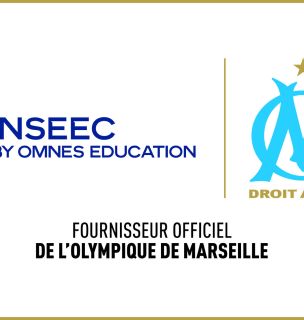The MSc Purchasing and Supply Chain Management course (French or English)
As its name indicates, this Master of Science offers training to students whose professional project is to join the purchasing and supply chain departments of a company, in operational as well as managerial and strategic functions.
This program offers a set of specialized and technical courses that lead the participants to a real expertise in the field with an international dimension.
All the faculty members bring tangible added value, reinforcing the professional character of this MSc. At the same time, students are trained in team management and leadership, which prepares them for future managerial tasks.

A title in 1 or 2 years to become an expert in procurement and logistics management
- Hourly volume 1st year of MSc: 441 hours
- Hourly volume 2nd year of MSc: 441 hours
The International Purchasing and Logistics program addresses issues related to purchasing and sourcing, the main management trends and supply chain policies. It integrates approaches based on low cost country sourcing, Supplier Relationship Management (SRM), sectoral and responsible purchasing, logistics flow management, volatility of raw materials and currencies, and sourcing. All these elements will be measured in order to impact the performance of companies.
The course prepares students for positions as purchasing managers, international buyers, supply chain managers and logisticians, both in SMEs and large international groups.
Young graduates will be able to work in the industrial, consumer goods and service sectors, as well as in new growth areas such as sustainable development and renewable energy.
Training objectives
The Purchasing and Supply Chain Manager designs and manages the purchasing and supply chain strategy (purchases, procurement, production, logistics) allowing the design and delivery of the company’s goods to the end customer. He also supervises the stocks and warehouses.
Given the very nature of its activity, CSR issues are an integral part of the purchasing strategy (choice of suppliers, products) and supply chain (consideration of the impact of transport modes…).
According to the size and organization of the company, and in a context of a trend towards hybridization of certain professions, professionals are brought to occupy a position as Purchasing and Supply Chain Manager in the broad sense of managing all processes. (purchasing, supply, production, logistics) or functions of Purchasing Manager, Buyer (at the beginning of their career), or even Supply Chain Manager.
How to apply for the MSc in Purchasing and Supply Chain Management at INSEEC ?
The required prerequisites
The conditions for accessing the certification system (excluding VAE) are :
- For entry into the 4th year (MSc 1): hold an RNCP level 6 qualification and/or have validated the equivalent of 180 validated ECTS in the field of management sciences, commerce, purchasing, supply chain or logistics. The candidate must have a professional level of English.
- For entry into the 5th year (MSc2): hold a RNCP level 6 qualification and/or have validated the equivalent of 240 ECTS acquired in the field of management sciences, commerce, purchasing, supply chain or logistics. The candidate must have a professional level of English.
Would you like to know more about the MSc in Purchasing & Supply Chain Management? Register for an information meeting!
Would you like to know more about the admission conditions for our training in Purchasing & Supply Chain Management?
What are the courses of the Master of Science Achats & Supply Chain Management ?
The courses presented below are given as an example, they may vary slightly depending on the teaching campus. The content of the courses is adapted each year to changes in the market and is updated before each start.
1st year courses
TRANSVERSAL & FUNDAMENTAL COURSES
MANAGEMENT COMPUTER
- This module aims to deepen the students’ computer skills to meet the demand of companies in terms of budget or commercial monitoring, project management, personnel management and communication: Excel, Word, PowerPoint, team work tools, business software.
- It aims to be efficient with office tools, quickly identify and correct errors, customize existing tools or create your own tools.
BUDGET MANAGEMENT & DASHBOARDS
The objective is to acquire key skills in terms of budget management and reporting. Particular emphasis will be placed on the budget architecture, with the implementation of summary documents, project management control and its link with budget management, the execution and management of dashboards.
NEGOTIATION
This module focuses on negotiation in a national and international context. It will be necessary to take into account the cultural dimension and define its impact in an international negotiation.
TOOLS & PROFESSIONAL METHODS
This module allows learners to improve their CV and their posture, notably through simulations (business game, professional simulation, speaking, etc.); practical and professionalizing workshops (CV, professional social networks, coaching, etc.) as well as professional and master class conferences.
BUSINESS ENGLISH
- Perfect comprehension and communication techniques in the English language in a financial and legal context.
- Students are required to take the TOEIC.
CORPORATE STRATEGY & BUSINESS PLAN
This module aims to learn how to create a Business Plan or business plan: costed project design for business creation or development. Several steps are addressed: feasibility study, market targeting, opportunities and risks, strengths and weaknesses, communication, financing plan and profitability.
SPECIALIZED COURSES
FIRST STEPS & ALGORYTHM
- Lay the essential foundations of data analysis by introducing the fundamental concepts of data manipulation and algorithms.
- Explore data types and sources, as well as methods for structuring, cleaning and analyzing them.
- Discover tools such as advanced spreadsheets and an introduction to Python.
- This course prepares to more advanced levels by developing practical skills and an ethical approach compliant with the GDPR.
DIGITALIZATION OF PURCHASES & SUPPLY CHAIN
This module allows you to identify and manage the digitalization of purchases by taking into account the tools, the digital factor, the key success factors, and everything that takes into account the advantages and risks for an existing company.
GEOPOLITICS AND BUSINESS LAW
- Geopolitics examines how international affairs can be understood through geographical and, in particular, territorial factors.
- This necessarily includes factors such as demography, culture, access to and transformation of natural resources, as well as how these physical realities play a vital role in business, both in business law and international law, as well as in national and international policy.
- The course will briefly examine the origins of geopolitics from a realistic and commercial approach taking into account nation-building, sovereignty, collective geographical identities, the world order, paying attention to the relevance of international law and business law.
- The study of international conflicts and their relevance for business and strategy will also be addressed.
MANAGEMENT OF LOGISTICS PROVIDERS & SUPPLIERS
Supplier management and sourcing is a multi-step process of creating and developing relationships with suppliers of goods and services, which a purchasing company needs to conduct its daily operations and achieve its objectives.
INTERNATIONAL ACCOUNTING AND FINANCIAL TECHNIQUES
The objective is to gain a fundamental understanding of accounting and finance, understand how the company and its results are represented in its financial statutes and understand how financial transactions are recognized, measured and recorded.
INTERNATIONAL PURCHASING
This module teaches the fundamentals of procurement processes used by international companies. The courses will combine theory and practical applications to illustrate the following key processes and measures: purchasing objectives, procurement process, tendering, supplier selection and management, contract negotiation, supply chain management, quality control, legal and contractual obligations.
INTERNATIONAL TRADE
- An introduction to the terminology, basics and initial concepts of international trade.
- This course provides students with tools to think strategically in a global environment.
LEAN MANUFACTURING & MANAGEMENT OF PRODUCTION FLOWS
Production and flow management is a major element for all companies. Lean manufacturing involves applying Lean management techniques to production flow management activities. This module allows learners to identify and eliminate all non-value-added activities, manufacture only what will be sold and move from a flow driven by real demand to a “just in time” production system.
FOREIGN LANGAGE
- Knowledge or mastery can be a distinctive element in the context of a job search.
- French as a foreign language is possible for international students.
MANAGEMENT OF LOGISTICS & INTERNATIONAL PROJECTS
This module covers the fundamental elements for developing the company’s logistics strategy, identifying the different stages of a logistical project and implementing a project management approach.
FINANCIAL PERFORMANCE APPLIED TO THE PURCHASING FUNCTION
- Impacts on gross margin and operating margin, management of working capital requirements, contribution to innovation and reduction of financial risks are now priority topics that the buyer must master.
PROCESS & TOOLS OF THE PURCHASING FUNCTION
This module focuses on the development of the purchasing process as well as mastering the main tools necessary for optimizing the supply chain. Presentation and experimentation of negotiation techniques (means, deadlines, subcontracting) both with employees, suppliers and service providers. A focus will also be made on the analysis of the purchase request and the drafting of specifications. Finally, the different forms of tender will be addressed as well as the standards and procedures related to purchasing techniques.
SUPPLY CHAIN MANAGEMENT LOGISTICS
Supply chain management that plans, implements and controls the efficient and effective flow and storage of upstream and downstream goods, services and related information between the point of origin and the point of consumption to meet customer requirements.
EXAMS
WRITTEN EXAMS
The 2nd year courses
PROCUREMENT & SUPPLY CHAIN STRATEGY
MANAGEMENT & PURCHASING & LOGISTICS STRATEGY
- Understanding the challenges of the strategic approach to ensure the company’s sustainability in a risky and constantly evolving environment.
- Analyze the company’s identity, organization and resources in order to position it on the path of sustainable development (Corporate Social Responsibility).
ETHICAL & GREEN PURCHASING SCM
In order to reduce the human, environmental and societal impacts related to purchasing, a process must be implemented. The purchasing department must commit to a CSR policy and the selection of suppliers based on relevant criteria. Green logistics is part of an ecological approach to reduce their impact on the environment and extends over the entire life cycle of the product.
PURCHASING STRATEGIES
At the end of the course, the student must be able to understand the positioning of Purchasing in a company’s strategy, to grasp the importance of the intervention of the Upstream Purchasing function, to select suppliers with adapted processes and to identify and control Purchase risks.
TOOLS & PROFESSIONAL METHODS
This module allows learners to improve their CV and posture through, in particular, simulations (professional simulation, speaking, etc.); practical and professionalizing workshops (CV, professional social networks, coaching, etc.) as well as professional and master class conferences.
MARKETING OF PURCHASES & INDUSTRIAL MARKETING
Procurement marketing allows the segmentation of the purchasing portfolio in order to know the market upstream from suppliers and to seize the opportunities offered by suppliers in order to meet the company’s needs.
PURCHASING PROCESS
SECTORAL PURCHASING & BUSINESS APPROACH
Purchases occupy a central place in the company’s activity. Their management must face new challenges such as price pressure, internationalization, outsourcing, the multi-channel dimension, sustainable development, and the permanent need for companies to evolve their offer. It is a central, major function that requires rigorous mastery and the use of efficient tools.
INTERNATIONAL BUSINESS LAW
- Introduction to the particular legal problems that arise when negotiating, concluding and performing contracts in an international context.
- International transactions may involve contracting parties from several countries and/or the performance of contractual obligations in several different countries.
- Particular emphasis is placed on the question of the choice of applicable law. The issue of legal aspects of e-commerce is also addressed.
MASS DISTRIBUTION & OPTIMIZATION OF THE PURCHASING FUNCTION
- Knowledge of the different types of purchasing groups (public purchasing group, cooperative purchasing group, integrated purchasing group, wholesale purchasing group).
- Research, choice and negotiation of products according to quality criteria, cost, margin, delivery time, both with manufacturers and large retailers. Negotiation of purchasing and supply conditions in conjunction with the logistics services.
INTERNATIONAL AND ADVANCED NEGOTIATION
This module is designed to teach the student the basics of international negotiation strategy and put the theory into practice through two intensive trade negotiations: an “internal” strategy reinforcement negotiation and a trade negotiation. The practical content of the negotiation is specific to the international business sector. Students are encouraged by follow-up reports to reveal and comment on their results.
INTERNATIONAL PURCHASING
This module is intended for current and future purchasing professionals and reflects the levels of understanding and competence necessary to assume the management of purchases at an international level.
MANAGEMENT OF SUPPLY CHAIN PROCESSES
PRODUCTION MANAGEMENT & SUPPLY CHAIN MANAGEMENT
Ce module permet de comprendre le rôle des achats dans la tension des flux logistiques et mettre en pratique tout en prenant du recul par rapport à des notions de logistique connues. Il permet aussi de savoir rédiger un contrat logistique et la prise en main d’un portefeuille d’achats.
LOGISTICS AND INTERNATIONAL TRADE
- Knowing how to manage logistics in an international market is defined by the management of import and export activities.
- Organization of cross-border transport exchanges by practicing all known logistics methods.
URBAN LOGISTICS
The digitalization of purchasing and logistics processes, particularly due to the rise of e-commerce and the urbanization of the population, is leading organizations towards a so-called urban logistics. This new issue of supply chain management thus becomes a new criterion for customer acquisition and loyalty.
OPERATIONS & GLOBAL SUPPLY CHAIN MANAGEMENT
- Provide a precise vision of the challenges and issues encountered in the management of companies’ activities: from the design of products/services, through their production, to the provision of these to customers.
- This course will show the strategic, tactical and operational choices of organizations and their articulation, throughout the global supply chain.
SUPPLY CHAIN RISK MANAGEMENT
Supply chain risk management is defined as the implementation of strategies to manage both daily and exceptional risks throughout the supply chain. This course will allow you to anticipate these risks within a company.
PERFORMANCE PURCHASING & LOGISTICS
TEAM & TALENT MANAGEMENT
- Define a Team & Talent Management strategy.
- Motivate and retain employees and build high-performance, multicultural teams.
FOREIGN LANGAGE
Knowledge or mastery can be a distinctive element in the context of a job search. French as a foreign language is possible for international students.
COST TRACKING & REPORTING
- Optimize and reduce expenses and costs in an efficient and stable way while maintaining the same quality on services and products.
SUPPLY CHAIN DIGITALIZATION AND DATA
The ultimate goal of the digital supply chain is to provide insights that increase efficiency, eliminate waste and increase profits.
APPLIED RESEARCH DISSERTATION
- Allow learners to know the expectations of the applied research thesis.
- Formulate an issue, build a review of the literature, choose the methodology of the study, issue recommendations.
EXAMS & SUPPORT
WRITTEN EXAMS & THESIS DEFENSE
What are the beginnings and study schedules ?
Two intakes per year are organized, in February/March and September/October. To check the opening of each school year, contact the admissions service directly.
The pace of courses can differ depending on the campus and whether the training is carried out under an internship agreement (initial) or a professionalization/learning contract (continuous).
The work-study contract must be signed for a duration of 12 months (MSc 2) or 24 months (MSc1 + MSc 2).
To find out the duration of the contract during the delayed start period, contact the campus admissions service that interests you directly.

What are the career opportunities after a MSc in Purchasing & Supply Chain Management ?
- Manager/Director of Purchasing and Supply Chain
- Supply Chain/Logistics Manager
- Buyer
- Manager/Purchasing Director
- Purchasing Manager
- Manager/Logistics Director
- Purchasing/Supply Chain/Logistics Consultant
- Procurement Manager
To consult the detailed business sheets by specialization.
What are the business skills developed ?
- Define the purchasing and supply chain policy aligned with the company’s strategy
- Drive the steps of the purchasing process
- Manage the supply chain processes
- Manage the performance of the Purchasing and Supply Chain activity
Description of the methods for obtaining certification by capitalization of skill blocks and/or by correspondence
Certification is obtained by :
- The validation of four blocks of skills common to all courses (obtaining a score greater than or equal to 10/20 for each block of skills)
- The completion of a corporate period of at least 132 days in the second year of the course (MSc 2)
Professional certification
Professional certification of ” Manager des Achats et de la Supply Chain“. This is a level 7 (EU) diploma, NSF codes 311 and 312, awarded by INSEEC MSc (CEE-SO, CEE-RA, CEFAS, MBA Institute, CEE-OUEST), registered under number 38496 in the RNCP (Répertoire National des Certifications Professionnelles) by decision of France Compétences on December 21, 2023.
The certification is issued by capitalization of the totality of the blocks of competences. Each competency of a block must be validated to validate the block of competencies. Partial validation of a block is not possible. It is also accessible through the Validation of Acquired Experience.
Find the blocks of competences associated with this RNCP title by clicking here .
What are the teaching methods ?
Teaching methods
- Lectures or/and interactive courses
- Situational exercises through collective or/and individual case studies carried out by the students
- Conferences, seminars or/and educational visits
Evaluation methods
- Individual or/and group case studies
- Individual or/and group oral presentations
- Individual or/and group files
- Applied research dissertation for individual defense
Methods and tools
- The evaluation methods are face-to-face, in the form of continuous assessment or final exams in the form of mid-term exams.
What are the 2025/2026 tuition fees to join the training ?
FALL INTAKE – 2025
Initial training:
- MSc1 : €12,190
- MSc2 : €13,650
Continuing education (sandwich course) :
- 24 months : €23,450 before tax
- MSc2 : €14,290 before tax
International students pack
Mandatory fee of €700 for exclusive support services for international students living outside the European Union.
SPRING INTAKE – 2026
Initial training:
- MSc1 : €12,190
- MSc2 : €13,650
Continuing education (sandwich course) :
- 24 months : €23,450 before tax
- MSc2 : €14,290 before tax
International students pack
Mandatory fee of €700 for exclusive support services for international students living outside the European Union.
AE/VAP
- VAE: €4,800 before tax
- VAP: €850 before tax
International students pack
Mandatory fee for exclusive support services for international students living outside the European Union.
- Fall intake (2025) – September/October: €700
- Spring intake (2026) – February/March: €700
Application fee
The application fee is €80.
What kind of financial aid is available?
INSEEC offers several financial aid schemes:
- The alternating rhythm, in internship or work-study contract
- The right to training via the CPF
- Banking partnerships
The key numbers for the RNCP title No. 38496 "Purchasing and Supply Chain Manager"
94%
National Success Rate – Class of 2024
94%
Presentation Rate – Class of 2024
78%
Overall employment rate (74 respondents out of 176) – Class of 2023
85%
Satisfaction rate at 6 months – Class of 2023
*The details are available on this document made available to you (national results and by regional certifier).
What is the Disability policy in our school ?
The OMNES Education Group pays particular attention to the societal environment, including the disability dimension. Indeed, we believe that students with disabilities should not have any problems in pursuing their studies and starting a professional career. We accompany them to facilitate their access to the premises, offer them personalized advice as well as adapted accommodations throughout their school career.
Accessibility of premises: all our campuses are accessible to people with disabilities.
To learn more about the OMNES Education Group’s disability policy, click here.
Contacts for disability referents by campus:
- Bordeaux : Maxime DOUENS – mdouens@inseec.com
- Lyon : Anissa GASMI – agasmi@inseec.com
- Rennes : Laura LE CALVEZ – llecalvez@omneseducation.com
- Paris : Farid HAMAD – fhamad@inseec.com
- Chambéry : Marianne FERLAY – mferlay@inseec-edu.com
- Marseille : Océane VALOTTI – ovalotti@omneseducation.com
- Toulouse : Amanda MARNEIX – amarneix@omneseducation.com
News

June 2024
INSEEC hosted the CFNews Grands Prix de la Croissance Externe Sud Ouest for the second year running
Read more





